Analyzing the Impact of Population on Water Supply in India
VerifiedAdded on 2021/04/21
|37
|11810
|349
Report
AI Summary
This report examines the significant impact of population growth on water supply in India, focusing on the engineering challenges and potential solutions. The report is structured around reflections on knowledge and skills, engineer application abilities, and professional attributes, including ethical conduct and team dynamics. It delves into the application of engineering and project management models to identify and document alternative solutions for water supply, considering social, environmental, and economic factors. The report also covers the importance of data collection, research methodologies, and team effectiveness in addressing these complex issues, culminating in an analysis of quantification and costing for proposed solutions. The study emphasizes sustainable practices and the need for engineers to consider legal and ethical requirements, especially within the context of India's high population density and environmental regulations. References to relevant literature support the analysis.
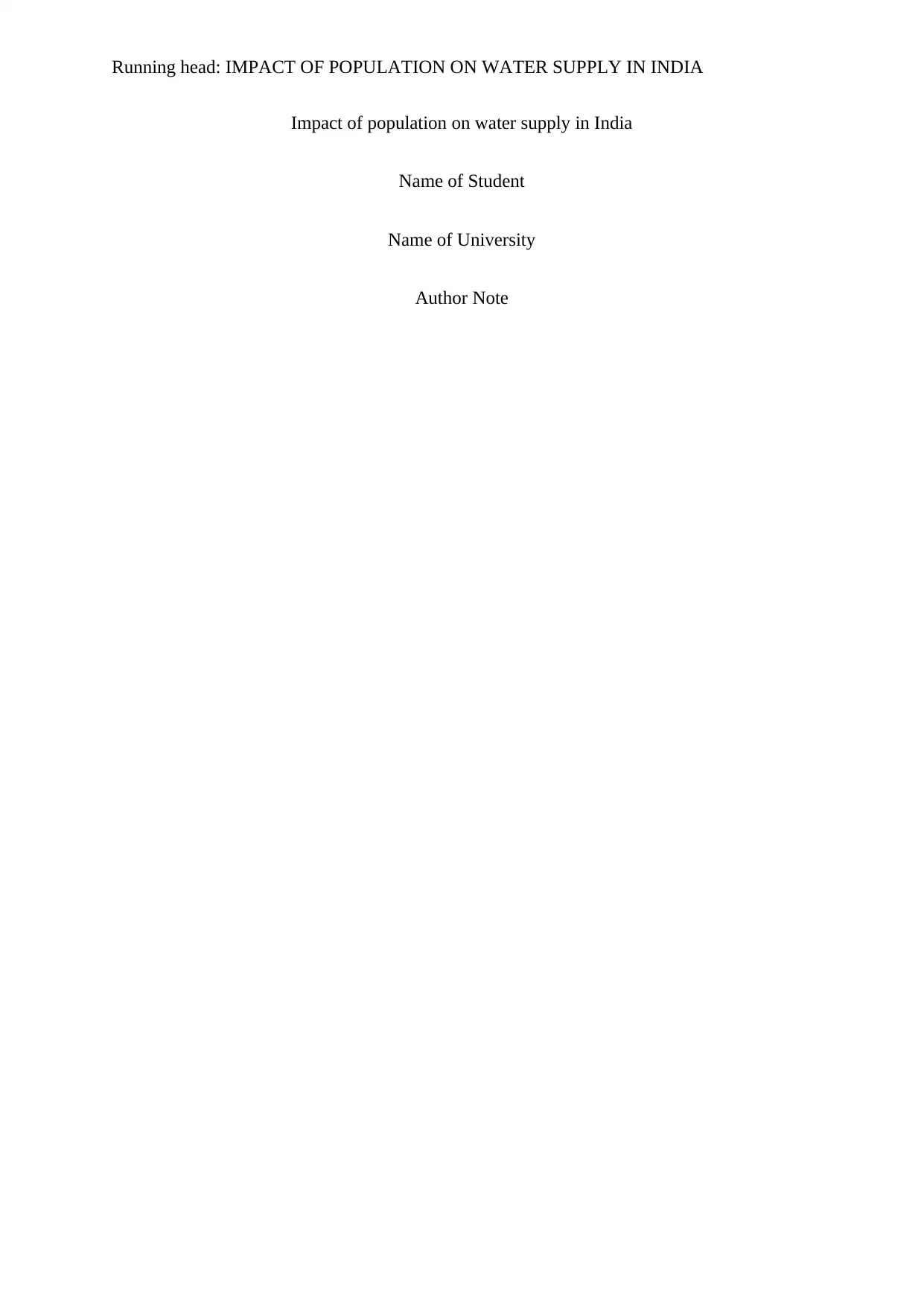
Running head: IMPACT OF POPULATION ON WATER SUPPLY IN INDIA
Impact of population on water supply in India
Name of Student
Name of University
Author Note
Impact of population on water supply in India
Name of Student
Name of University
Author Note
Paraphrase This Document
Need a fresh take? Get an instant paraphrase of this document with our AI Paraphraser
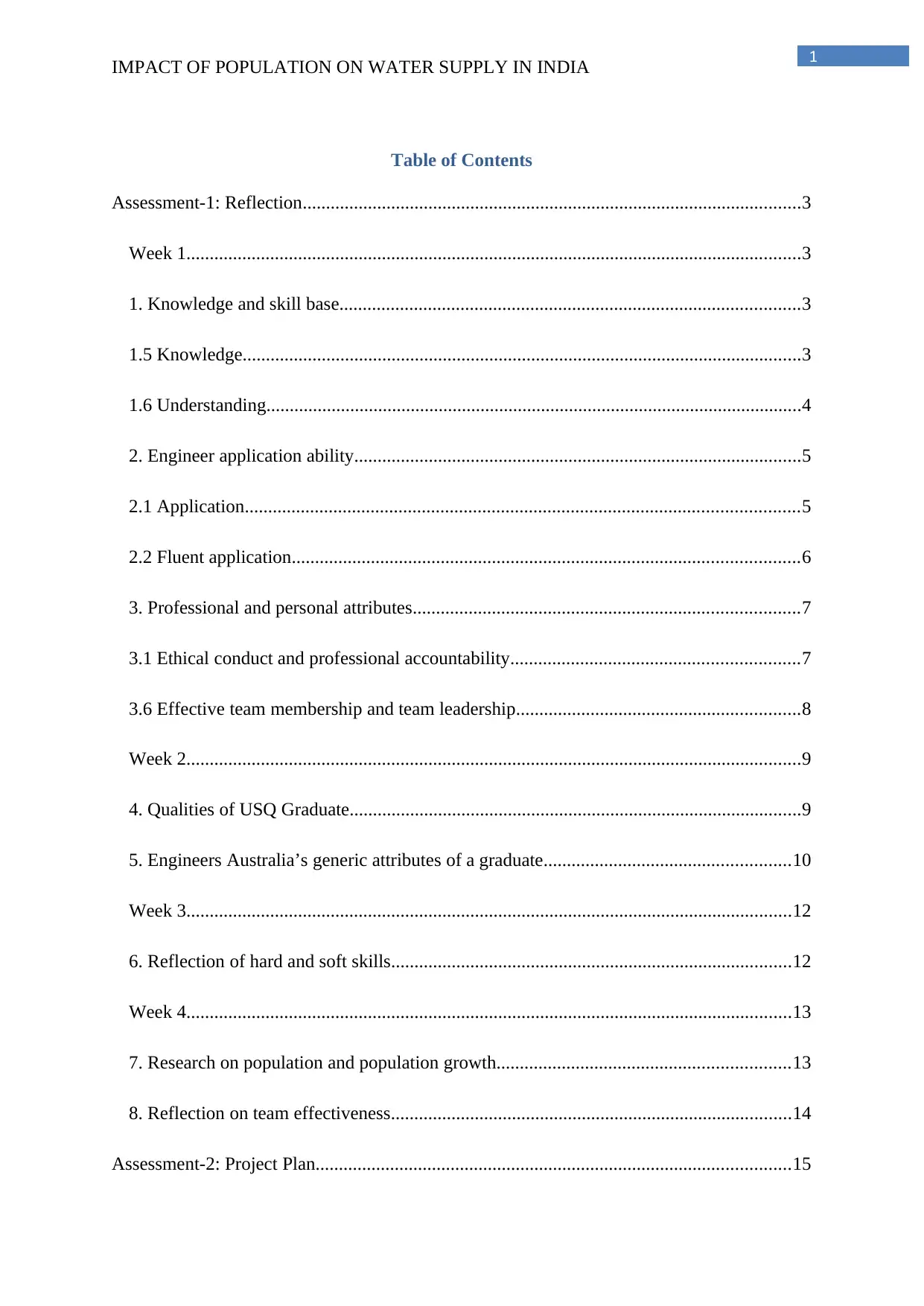
1
IMPACT OF POPULATION ON WATER SUPPLY IN INDIA
Table of Contents
Assessment-1: Reflection...........................................................................................................3
Week 1....................................................................................................................................3
1. Knowledge and skill base...................................................................................................3
1.5 Knowledge........................................................................................................................3
1.6 Understanding...................................................................................................................4
2. Engineer application ability................................................................................................5
2.1 Application.......................................................................................................................5
2.2 Fluent application.............................................................................................................6
3. Professional and personal attributes...................................................................................7
3.1 Ethical conduct and professional accountability..............................................................7
3.6 Effective team membership and team leadership.............................................................8
Week 2....................................................................................................................................9
4. Qualities of USQ Graduate.................................................................................................9
5. Engineers Australia’s generic attributes of a graduate.....................................................10
Week 3..................................................................................................................................12
6. Reflection of hard and soft skills......................................................................................12
Week 4..................................................................................................................................13
7. Research on population and population growth...............................................................13
8. Reflection on team effectiveness......................................................................................14
Assessment-2: Project Plan......................................................................................................15
IMPACT OF POPULATION ON WATER SUPPLY IN INDIA
Table of Contents
Assessment-1: Reflection...........................................................................................................3
Week 1....................................................................................................................................3
1. Knowledge and skill base...................................................................................................3
1.5 Knowledge........................................................................................................................3
1.6 Understanding...................................................................................................................4
2. Engineer application ability................................................................................................5
2.1 Application.......................................................................................................................5
2.2 Fluent application.............................................................................................................6
3. Professional and personal attributes...................................................................................7
3.1 Ethical conduct and professional accountability..............................................................7
3.6 Effective team membership and team leadership.............................................................8
Week 2....................................................................................................................................9
4. Qualities of USQ Graduate.................................................................................................9
5. Engineers Australia’s generic attributes of a graduate.....................................................10
Week 3..................................................................................................................................12
6. Reflection of hard and soft skills......................................................................................12
Week 4..................................................................................................................................13
7. Research on population and population growth...............................................................13
8. Reflection on team effectiveness......................................................................................14
Assessment-2: Project Plan......................................................................................................15
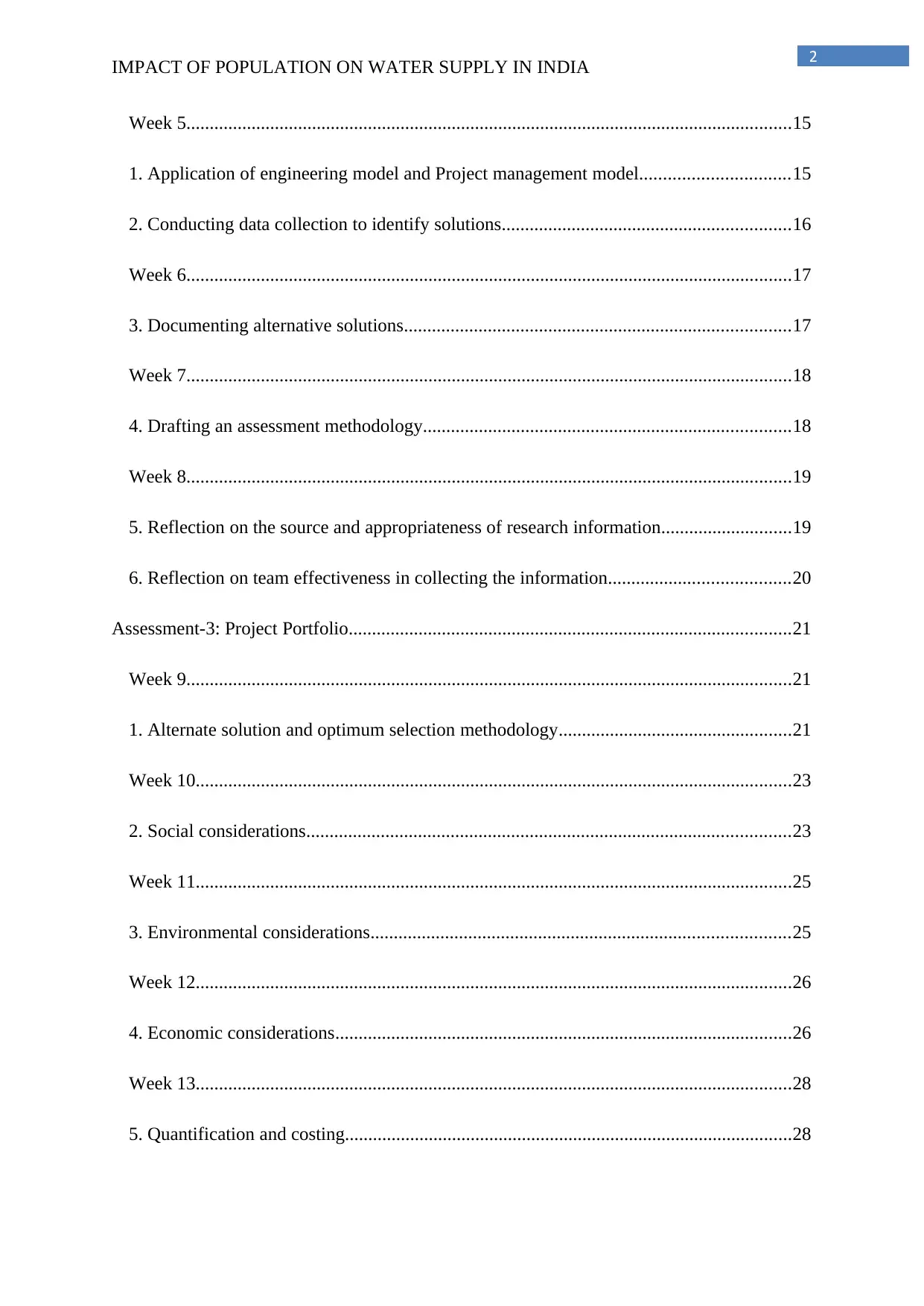
2
IMPACT OF POPULATION ON WATER SUPPLY IN INDIA
Week 5..................................................................................................................................15
1. Application of engineering model and Project management model................................15
2. Conducting data collection to identify solutions..............................................................16
Week 6..................................................................................................................................17
3. Documenting alternative solutions...................................................................................17
Week 7..................................................................................................................................18
4. Drafting an assessment methodology...............................................................................18
Week 8..................................................................................................................................19
5. Reflection on the source and appropriateness of research information............................19
6. Reflection on team effectiveness in collecting the information.......................................20
Assessment-3: Project Portfolio...............................................................................................21
Week 9..................................................................................................................................21
1. Alternate solution and optimum selection methodology..................................................21
Week 10................................................................................................................................23
2. Social considerations........................................................................................................23
Week 11................................................................................................................................25
3. Environmental considerations..........................................................................................25
Week 12................................................................................................................................26
4. Economic considerations..................................................................................................26
Week 13................................................................................................................................28
5. Quantification and costing................................................................................................28
IMPACT OF POPULATION ON WATER SUPPLY IN INDIA
Week 5..................................................................................................................................15
1. Application of engineering model and Project management model................................15
2. Conducting data collection to identify solutions..............................................................16
Week 6..................................................................................................................................17
3. Documenting alternative solutions...................................................................................17
Week 7..................................................................................................................................18
4. Drafting an assessment methodology...............................................................................18
Week 8..................................................................................................................................19
5. Reflection on the source and appropriateness of research information............................19
6. Reflection on team effectiveness in collecting the information.......................................20
Assessment-3: Project Portfolio...............................................................................................21
Week 9..................................................................................................................................21
1. Alternate solution and optimum selection methodology..................................................21
Week 10................................................................................................................................23
2. Social considerations........................................................................................................23
Week 11................................................................................................................................25
3. Environmental considerations..........................................................................................25
Week 12................................................................................................................................26
4. Economic considerations..................................................................................................26
Week 13................................................................................................................................28
5. Quantification and costing................................................................................................28
⊘ This is a preview!⊘
Do you want full access?
Subscribe today to unlock all pages.

Trusted by 1+ million students worldwide
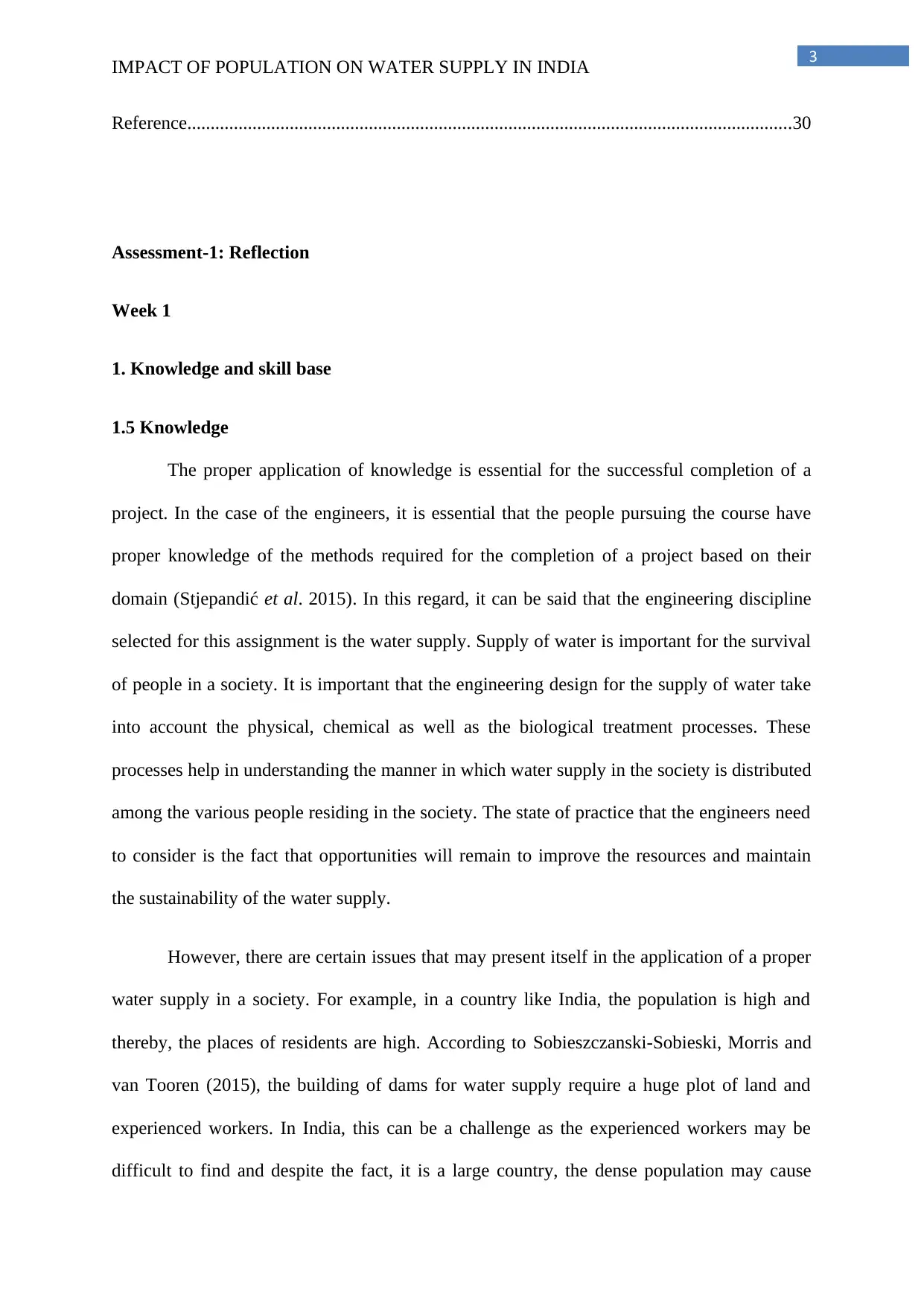
3
IMPACT OF POPULATION ON WATER SUPPLY IN INDIA
Reference..................................................................................................................................30
Assessment-1: Reflection
Week 1
1. Knowledge and skill base
1.5 Knowledge
The proper application of knowledge is essential for the successful completion of a
project. In the case of the engineers, it is essential that the people pursuing the course have
proper knowledge of the methods required for the completion of a project based on their
domain (Stjepandić et al. 2015). In this regard, it can be said that the engineering discipline
selected for this assignment is the water supply. Supply of water is important for the survival
of people in a society. It is important that the engineering design for the supply of water take
into account the physical, chemical as well as the biological treatment processes. These
processes help in understanding the manner in which water supply in the society is distributed
among the various people residing in the society. The state of practice that the engineers need
to consider is the fact that opportunities will remain to improve the resources and maintain
the sustainability of the water supply.
However, there are certain issues that may present itself in the application of a proper
water supply in a society. For example, in a country like India, the population is high and
thereby, the places of residents are high. According to Sobieszczanski-Sobieski, Morris and
van Tooren (2015), the building of dams for water supply require a huge plot of land and
experienced workers. In India, this can be a challenge as the experienced workers may be
difficult to find and despite the fact, it is a large country, the dense population may cause
IMPACT OF POPULATION ON WATER SUPPLY IN INDIA
Reference..................................................................................................................................30
Assessment-1: Reflection
Week 1
1. Knowledge and skill base
1.5 Knowledge
The proper application of knowledge is essential for the successful completion of a
project. In the case of the engineers, it is essential that the people pursuing the course have
proper knowledge of the methods required for the completion of a project based on their
domain (Stjepandić et al. 2015). In this regard, it can be said that the engineering discipline
selected for this assignment is the water supply. Supply of water is important for the survival
of people in a society. It is important that the engineering design for the supply of water take
into account the physical, chemical as well as the biological treatment processes. These
processes help in understanding the manner in which water supply in the society is distributed
among the various people residing in the society. The state of practice that the engineers need
to consider is the fact that opportunities will remain to improve the resources and maintain
the sustainability of the water supply.
However, there are certain issues that may present itself in the application of a proper
water supply in a society. For example, in a country like India, the population is high and
thereby, the places of residents are high. According to Sobieszczanski-Sobieski, Morris and
van Tooren (2015), the building of dams for water supply require a huge plot of land and
experienced workers. In India, this can be a challenge as the experienced workers may be
difficult to find and despite the fact, it is a large country, the dense population may cause
Paraphrase This Document
Need a fresh take? Get an instant paraphrase of this document with our AI Paraphraser
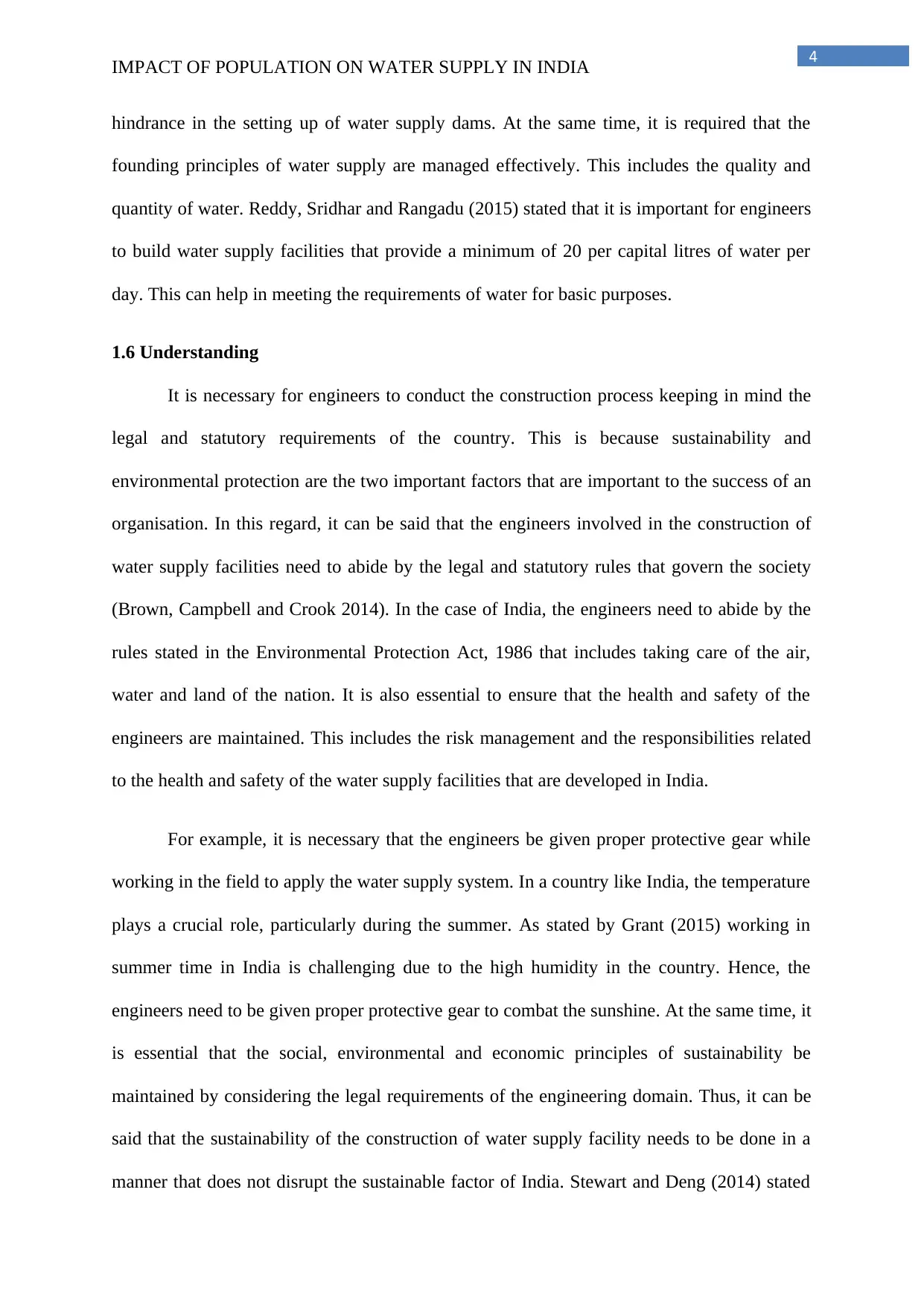
4
IMPACT OF POPULATION ON WATER SUPPLY IN INDIA
hindrance in the setting up of water supply dams. At the same time, it is required that the
founding principles of water supply are managed effectively. This includes the quality and
quantity of water. Reddy, Sridhar and Rangadu (2015) stated that it is important for engineers
to build water supply facilities that provide a minimum of 20 per capital litres of water per
day. This can help in meeting the requirements of water for basic purposes.
1.6 Understanding
It is necessary for engineers to conduct the construction process keeping in mind the
legal and statutory requirements of the country. This is because sustainability and
environmental protection are the two important factors that are important to the success of an
organisation. In this regard, it can be said that the engineers involved in the construction of
water supply facilities need to abide by the legal and statutory rules that govern the society
(Brown, Campbell and Crook 2014). In the case of India, the engineers need to abide by the
rules stated in the Environmental Protection Act, 1986 that includes taking care of the air,
water and land of the nation. It is also essential to ensure that the health and safety of the
engineers are maintained. This includes the risk management and the responsibilities related
to the health and safety of the water supply facilities that are developed in India.
For example, it is necessary that the engineers be given proper protective gear while
working in the field to apply the water supply system. In a country like India, the temperature
plays a crucial role, particularly during the summer. As stated by Grant (2015) working in
summer time in India is challenging due to the high humidity in the country. Hence, the
engineers need to be given proper protective gear to combat the sunshine. At the same time, it
is essential that the social, environmental and economic principles of sustainability be
maintained by considering the legal requirements of the engineering domain. Thus, it can be
said that the sustainability of the construction of water supply facility needs to be done in a
manner that does not disrupt the sustainable factor of India. Stewart and Deng (2014) stated
IMPACT OF POPULATION ON WATER SUPPLY IN INDIA
hindrance in the setting up of water supply dams. At the same time, it is required that the
founding principles of water supply are managed effectively. This includes the quality and
quantity of water. Reddy, Sridhar and Rangadu (2015) stated that it is important for engineers
to build water supply facilities that provide a minimum of 20 per capital litres of water per
day. This can help in meeting the requirements of water for basic purposes.
1.6 Understanding
It is necessary for engineers to conduct the construction process keeping in mind the
legal and statutory requirements of the country. This is because sustainability and
environmental protection are the two important factors that are important to the success of an
organisation. In this regard, it can be said that the engineers involved in the construction of
water supply facilities need to abide by the legal and statutory rules that govern the society
(Brown, Campbell and Crook 2014). In the case of India, the engineers need to abide by the
rules stated in the Environmental Protection Act, 1986 that includes taking care of the air,
water and land of the nation. It is also essential to ensure that the health and safety of the
engineers are maintained. This includes the risk management and the responsibilities related
to the health and safety of the water supply facilities that are developed in India.
For example, it is necessary that the engineers be given proper protective gear while
working in the field to apply the water supply system. In a country like India, the temperature
plays a crucial role, particularly during the summer. As stated by Grant (2015) working in
summer time in India is challenging due to the high humidity in the country. Hence, the
engineers need to be given proper protective gear to combat the sunshine. At the same time, it
is essential that the social, environmental and economic principles of sustainability be
maintained by considering the legal requirements of the engineering domain. Thus, it can be
said that the sustainability of the construction of water supply facility needs to be done in a
manner that does not disrupt the sustainable factor of India. Stewart and Deng (2014) stated
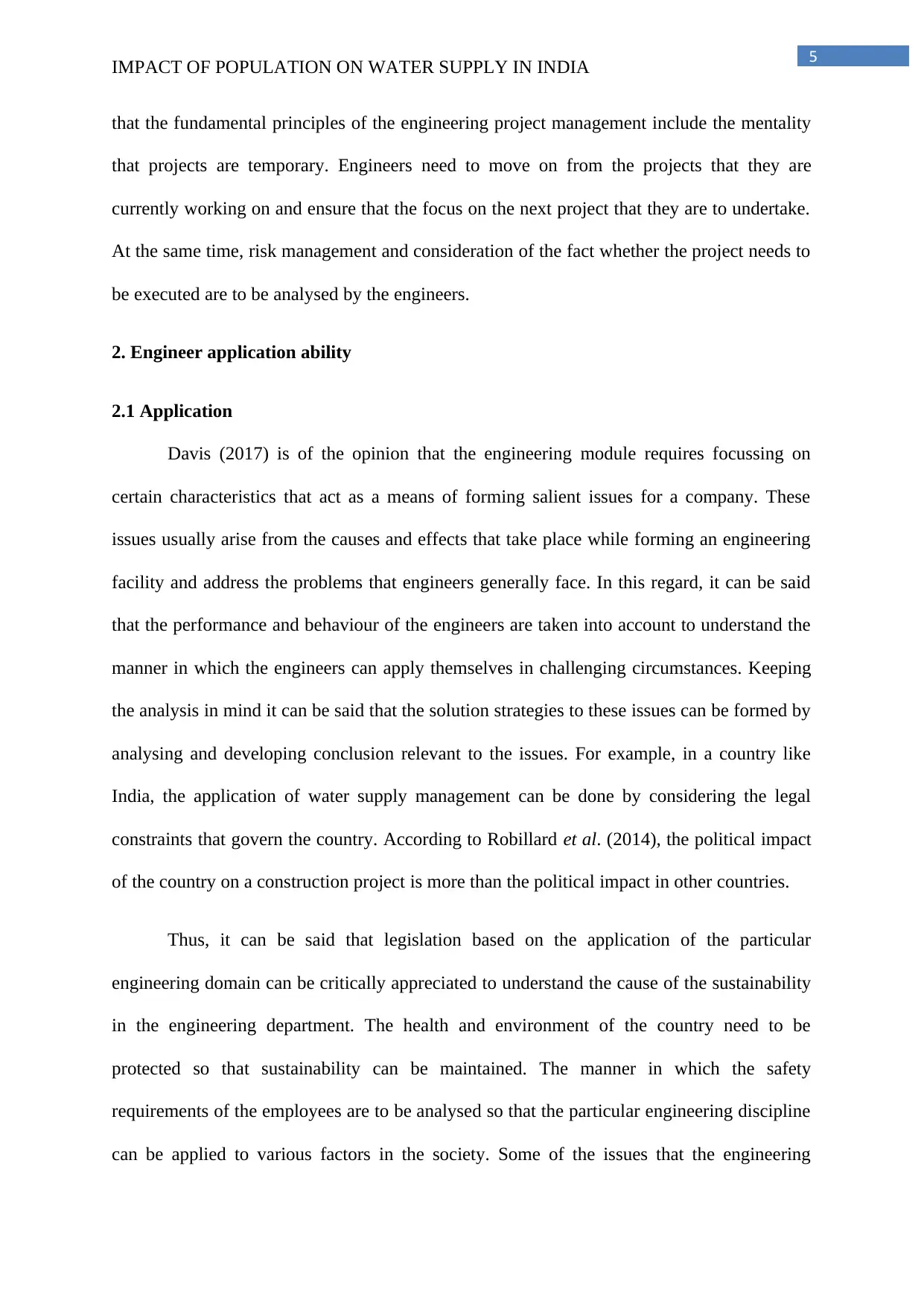
5
IMPACT OF POPULATION ON WATER SUPPLY IN INDIA
that the fundamental principles of the engineering project management include the mentality
that projects are temporary. Engineers need to move on from the projects that they are
currently working on and ensure that the focus on the next project that they are to undertake.
At the same time, risk management and consideration of the fact whether the project needs to
be executed are to be analysed by the engineers.
2. Engineer application ability
2.1 Application
Davis (2017) is of the opinion that the engineering module requires focussing on
certain characteristics that act as a means of forming salient issues for a company. These
issues usually arise from the causes and effects that take place while forming an engineering
facility and address the problems that engineers generally face. In this regard, it can be said
that the performance and behaviour of the engineers are taken into account to understand the
manner in which the engineers can apply themselves in challenging circumstances. Keeping
the analysis in mind it can be said that the solution strategies to these issues can be formed by
analysing and developing conclusion relevant to the issues. For example, in a country like
India, the application of water supply management can be done by considering the legal
constraints that govern the country. According to Robillard et al. (2014), the political impact
of the country on a construction project is more than the political impact in other countries.
Thus, it can be said that legislation based on the application of the particular
engineering domain can be critically appreciated to understand the cause of the sustainability
in the engineering department. The health and environment of the country need to be
protected so that sustainability can be maintained. The manner in which the safety
requirements of the employees are to be analysed so that the particular engineering discipline
can be applied to various factors in the society. Some of the issues that the engineering
IMPACT OF POPULATION ON WATER SUPPLY IN INDIA
that the fundamental principles of the engineering project management include the mentality
that projects are temporary. Engineers need to move on from the projects that they are
currently working on and ensure that the focus on the next project that they are to undertake.
At the same time, risk management and consideration of the fact whether the project needs to
be executed are to be analysed by the engineers.
2. Engineer application ability
2.1 Application
Davis (2017) is of the opinion that the engineering module requires focussing on
certain characteristics that act as a means of forming salient issues for a company. These
issues usually arise from the causes and effects that take place while forming an engineering
facility and address the problems that engineers generally face. In this regard, it can be said
that the performance and behaviour of the engineers are taken into account to understand the
manner in which the engineers can apply themselves in challenging circumstances. Keeping
the analysis in mind it can be said that the solution strategies to these issues can be formed by
analysing and developing conclusion relevant to the issues. For example, in a country like
India, the application of water supply management can be done by considering the legal
constraints that govern the country. According to Robillard et al. (2014), the political impact
of the country on a construction project is more than the political impact in other countries.
Thus, it can be said that legislation based on the application of the particular
engineering domain can be critically appreciated to understand the cause of the sustainability
in the engineering department. The health and environment of the country need to be
protected so that sustainability can be maintained. The manner in which the safety
requirements of the employees are to be analysed so that the particular engineering discipline
can be applied to various factors in the society. Some of the issues that the engineering
⊘ This is a preview!⊘
Do you want full access?
Subscribe today to unlock all pages.

Trusted by 1+ million students worldwide
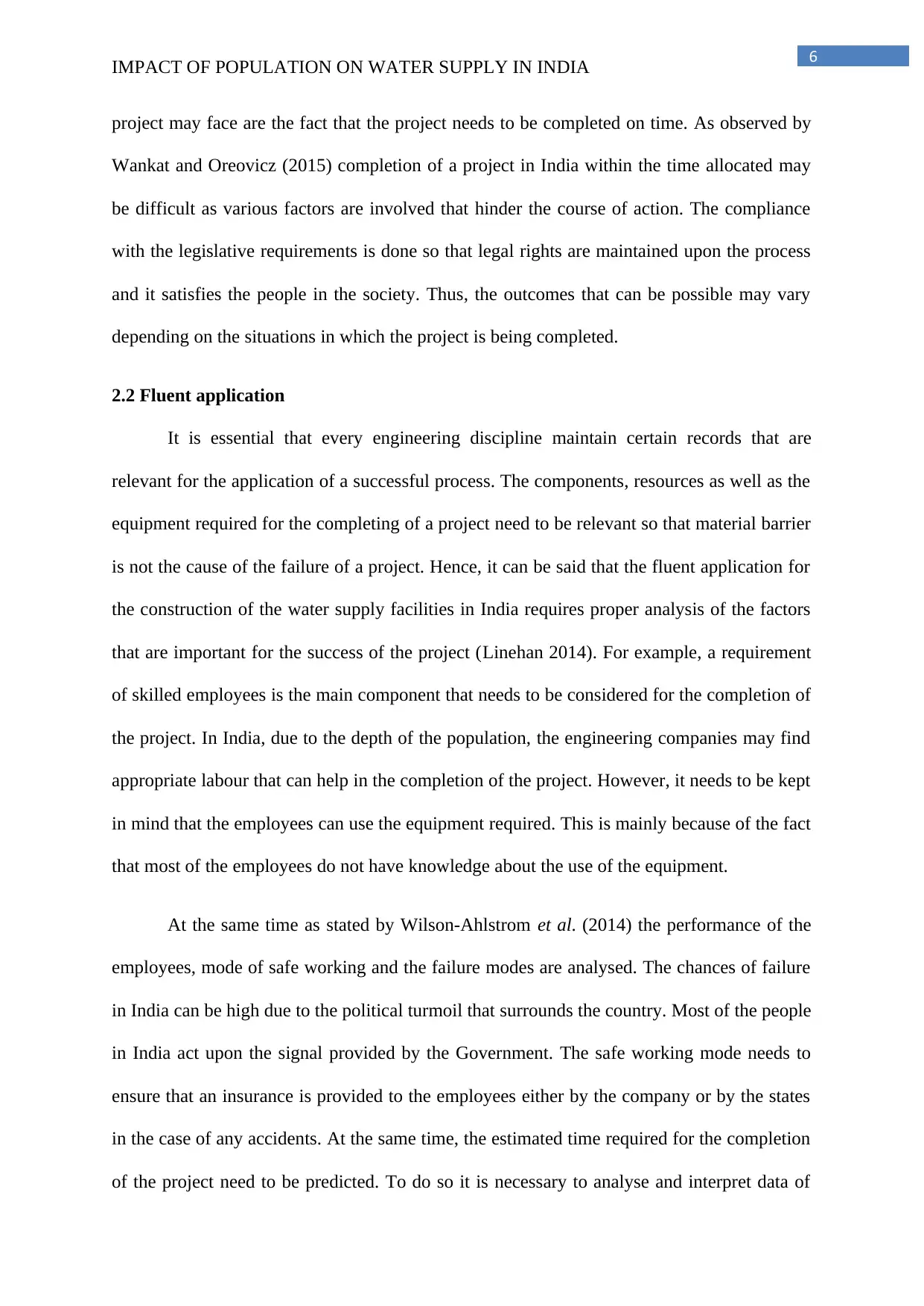
6
IMPACT OF POPULATION ON WATER SUPPLY IN INDIA
project may face are the fact that the project needs to be completed on time. As observed by
Wankat and Oreovicz (2015) completion of a project in India within the time allocated may
be difficult as various factors are involved that hinder the course of action. The compliance
with the legislative requirements is done so that legal rights are maintained upon the process
and it satisfies the people in the society. Thus, the outcomes that can be possible may vary
depending on the situations in which the project is being completed.
2.2 Fluent application
It is essential that every engineering discipline maintain certain records that are
relevant for the application of a successful process. The components, resources as well as the
equipment required for the completing of a project need to be relevant so that material barrier
is not the cause of the failure of a project. Hence, it can be said that the fluent application for
the construction of the water supply facilities in India requires proper analysis of the factors
that are important for the success of the project (Linehan 2014). For example, a requirement
of skilled employees is the main component that needs to be considered for the completion of
the project. In India, due to the depth of the population, the engineering companies may find
appropriate labour that can help in the completion of the project. However, it needs to be kept
in mind that the employees can use the equipment required. This is mainly because of the fact
that most of the employees do not have knowledge about the use of the equipment.
At the same time as stated by Wilson-Ahlstrom et al. (2014) the performance of the
employees, mode of safe working and the failure modes are analysed. The chances of failure
in India can be high due to the political turmoil that surrounds the country. Most of the people
in India act upon the signal provided by the Government. The safe working mode needs to
ensure that an insurance is provided to the employees either by the company or by the states
in the case of any accidents. At the same time, the estimated time required for the completion
of the project need to be predicted. To do so it is necessary to analyse and interpret data of
IMPACT OF POPULATION ON WATER SUPPLY IN INDIA
project may face are the fact that the project needs to be completed on time. As observed by
Wankat and Oreovicz (2015) completion of a project in India within the time allocated may
be difficult as various factors are involved that hinder the course of action. The compliance
with the legislative requirements is done so that legal rights are maintained upon the process
and it satisfies the people in the society. Thus, the outcomes that can be possible may vary
depending on the situations in which the project is being completed.
2.2 Fluent application
It is essential that every engineering discipline maintain certain records that are
relevant for the application of a successful process. The components, resources as well as the
equipment required for the completing of a project need to be relevant so that material barrier
is not the cause of the failure of a project. Hence, it can be said that the fluent application for
the construction of the water supply facilities in India requires proper analysis of the factors
that are important for the success of the project (Linehan 2014). For example, a requirement
of skilled employees is the main component that needs to be considered for the completion of
the project. In India, due to the depth of the population, the engineering companies may find
appropriate labour that can help in the completion of the project. However, it needs to be kept
in mind that the employees can use the equipment required. This is mainly because of the fact
that most of the employees do not have knowledge about the use of the equipment.
At the same time as stated by Wilson-Ahlstrom et al. (2014) the performance of the
employees, mode of safe working and the failure modes are analysed. The chances of failure
in India can be high due to the political turmoil that surrounds the country. Most of the people
in India act upon the signal provided by the Government. The safe working mode needs to
ensure that an insurance is provided to the employees either by the company or by the states
in the case of any accidents. At the same time, the estimated time required for the completion
of the project need to be predicted. To do so it is necessary to analyse and interpret data of
Paraphrase This Document
Need a fresh take? Get an instant paraphrase of this document with our AI Paraphraser
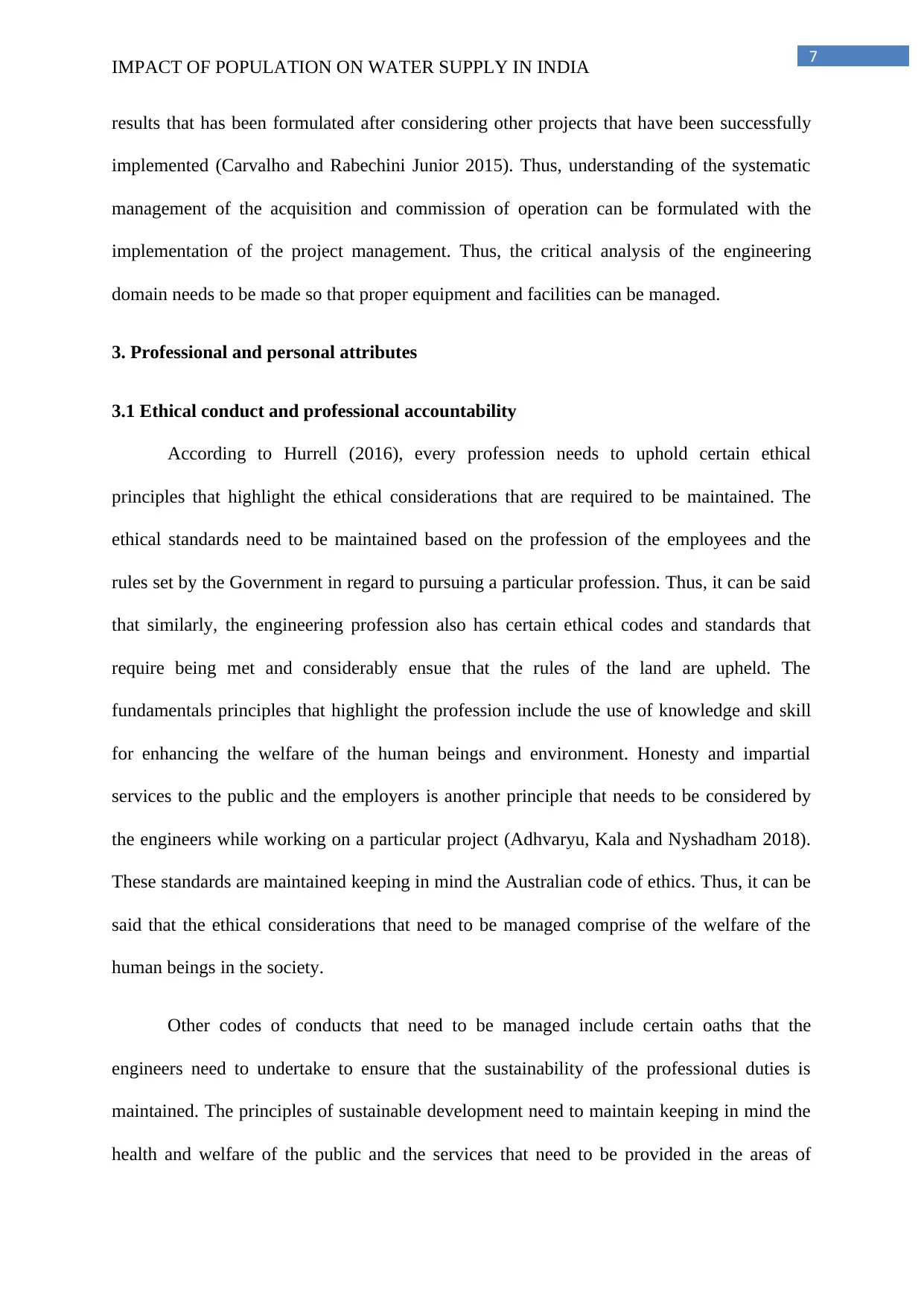
7
IMPACT OF POPULATION ON WATER SUPPLY IN INDIA
results that has been formulated after considering other projects that have been successfully
implemented (Carvalho and Rabechini Junior 2015). Thus, understanding of the systematic
management of the acquisition and commission of operation can be formulated with the
implementation of the project management. Thus, the critical analysis of the engineering
domain needs to be made so that proper equipment and facilities can be managed.
3. Professional and personal attributes
3.1 Ethical conduct and professional accountability
According to Hurrell (2016), every profession needs to uphold certain ethical
principles that highlight the ethical considerations that are required to be maintained. The
ethical standards need to be maintained based on the profession of the employees and the
rules set by the Government in regard to pursuing a particular profession. Thus, it can be said
that similarly, the engineering profession also has certain ethical codes and standards that
require being met and considerably ensue that the rules of the land are upheld. The
fundamentals principles that highlight the profession include the use of knowledge and skill
for enhancing the welfare of the human beings and environment. Honesty and impartial
services to the public and the employers is another principle that needs to be considered by
the engineers while working on a particular project (Adhvaryu, Kala and Nyshadham 2018).
These standards are maintained keeping in mind the Australian code of ethics. Thus, it can be
said that the ethical considerations that need to be managed comprise of the welfare of the
human beings in the society.
Other codes of conducts that need to be managed include certain oaths that the
engineers need to undertake to ensure that the sustainability of the professional duties is
maintained. The principles of sustainable development need to maintain keeping in mind the
health and welfare of the public and the services that need to be provided in the areas of
IMPACT OF POPULATION ON WATER SUPPLY IN INDIA
results that has been formulated after considering other projects that have been successfully
implemented (Carvalho and Rabechini Junior 2015). Thus, understanding of the systematic
management of the acquisition and commission of operation can be formulated with the
implementation of the project management. Thus, the critical analysis of the engineering
domain needs to be made so that proper equipment and facilities can be managed.
3. Professional and personal attributes
3.1 Ethical conduct and professional accountability
According to Hurrell (2016), every profession needs to uphold certain ethical
principles that highlight the ethical considerations that are required to be maintained. The
ethical standards need to be maintained based on the profession of the employees and the
rules set by the Government in regard to pursuing a particular profession. Thus, it can be said
that similarly, the engineering profession also has certain ethical codes and standards that
require being met and considerably ensue that the rules of the land are upheld. The
fundamentals principles that highlight the profession include the use of knowledge and skill
for enhancing the welfare of the human beings and environment. Honesty and impartial
services to the public and the employers is another principle that needs to be considered by
the engineers while working on a particular project (Adhvaryu, Kala and Nyshadham 2018).
These standards are maintained keeping in mind the Australian code of ethics. Thus, it can be
said that the ethical considerations that need to be managed comprise of the welfare of the
human beings in the society.
Other codes of conducts that need to be managed include certain oaths that the
engineers need to undertake to ensure that the sustainability of the professional duties is
maintained. The principles of sustainable development need to maintain keeping in mind the
health and welfare of the public and the services that need to be provided in the areas of
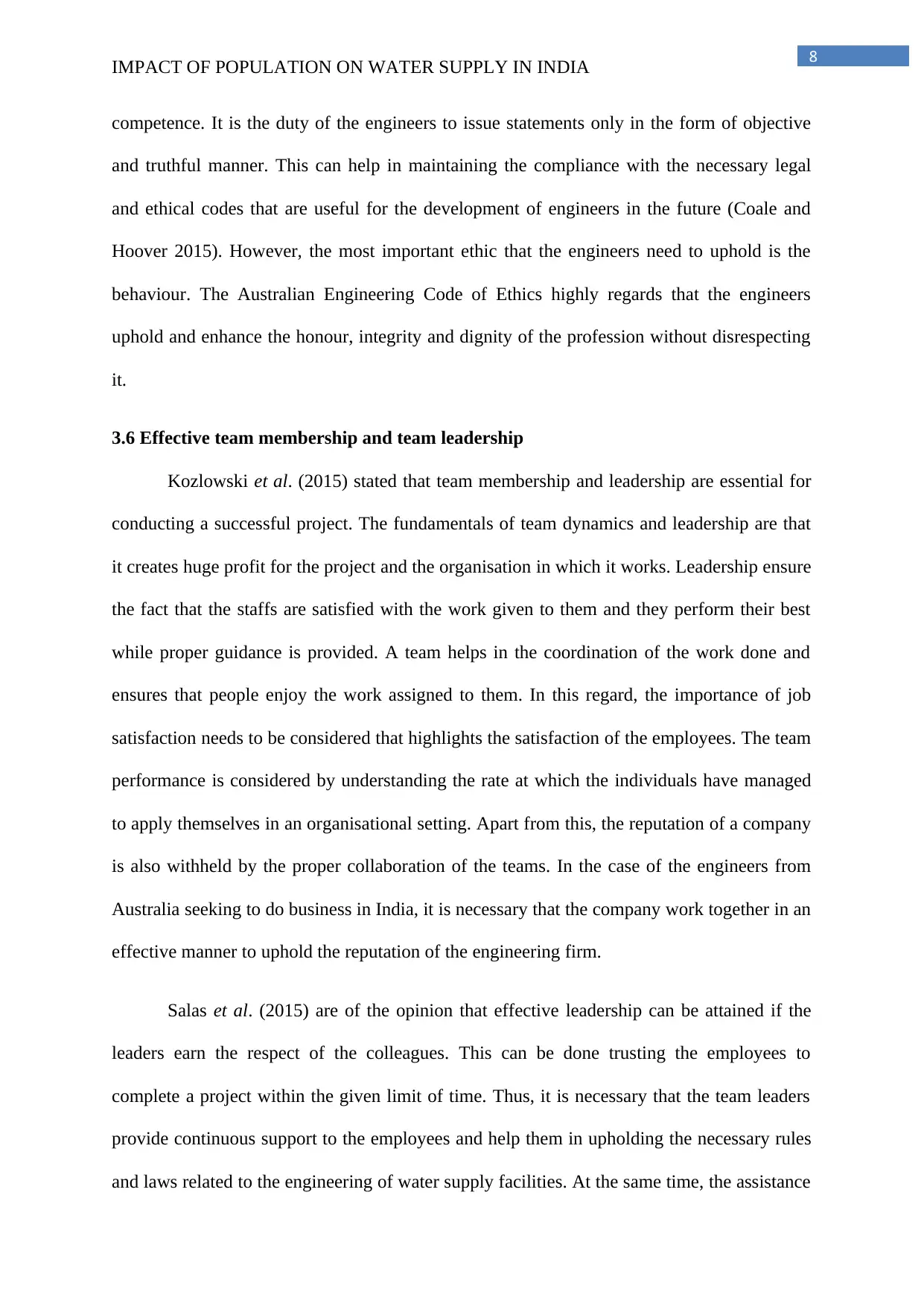
8
IMPACT OF POPULATION ON WATER SUPPLY IN INDIA
competence. It is the duty of the engineers to issue statements only in the form of objective
and truthful manner. This can help in maintaining the compliance with the necessary legal
and ethical codes that are useful for the development of engineers in the future (Coale and
Hoover 2015). However, the most important ethic that the engineers need to uphold is the
behaviour. The Australian Engineering Code of Ethics highly regards that the engineers
uphold and enhance the honour, integrity and dignity of the profession without disrespecting
it.
3.6 Effective team membership and team leadership
Kozlowski et al. (2015) stated that team membership and leadership are essential for
conducting a successful project. The fundamentals of team dynamics and leadership are that
it creates huge profit for the project and the organisation in which it works. Leadership ensure
the fact that the staffs are satisfied with the work given to them and they perform their best
while proper guidance is provided. A team helps in the coordination of the work done and
ensures that people enjoy the work assigned to them. In this regard, the importance of job
satisfaction needs to be considered that highlights the satisfaction of the employees. The team
performance is considered by understanding the rate at which the individuals have managed
to apply themselves in an organisational setting. Apart from this, the reputation of a company
is also withheld by the proper collaboration of the teams. In the case of the engineers from
Australia seeking to do business in India, it is necessary that the company work together in an
effective manner to uphold the reputation of the engineering firm.
Salas et al. (2015) are of the opinion that effective leadership can be attained if the
leaders earn the respect of the colleagues. This can be done trusting the employees to
complete a project within the given limit of time. Thus, it is necessary that the team leaders
provide continuous support to the employees and help them in upholding the necessary rules
and laws related to the engineering of water supply facilities. At the same time, the assistance
IMPACT OF POPULATION ON WATER SUPPLY IN INDIA
competence. It is the duty of the engineers to issue statements only in the form of objective
and truthful manner. This can help in maintaining the compliance with the necessary legal
and ethical codes that are useful for the development of engineers in the future (Coale and
Hoover 2015). However, the most important ethic that the engineers need to uphold is the
behaviour. The Australian Engineering Code of Ethics highly regards that the engineers
uphold and enhance the honour, integrity and dignity of the profession without disrespecting
it.
3.6 Effective team membership and team leadership
Kozlowski et al. (2015) stated that team membership and leadership are essential for
conducting a successful project. The fundamentals of team dynamics and leadership are that
it creates huge profit for the project and the organisation in which it works. Leadership ensure
the fact that the staffs are satisfied with the work given to them and they perform their best
while proper guidance is provided. A team helps in the coordination of the work done and
ensures that people enjoy the work assigned to them. In this regard, the importance of job
satisfaction needs to be considered that highlights the satisfaction of the employees. The team
performance is considered by understanding the rate at which the individuals have managed
to apply themselves in an organisational setting. Apart from this, the reputation of a company
is also withheld by the proper collaboration of the teams. In the case of the engineers from
Australia seeking to do business in India, it is necessary that the company work together in an
effective manner to uphold the reputation of the engineering firm.
Salas et al. (2015) are of the opinion that effective leadership can be attained if the
leaders earn the respect of the colleagues. This can be done trusting the employees to
complete a project within the given limit of time. Thus, it is necessary that the team leaders
provide continuous support to the employees and help them in upholding the necessary rules
and laws related to the engineering of water supply facilities. At the same time, the assistance
⊘ This is a preview!⊘
Do you want full access?
Subscribe today to unlock all pages.

Trusted by 1+ million students worldwide
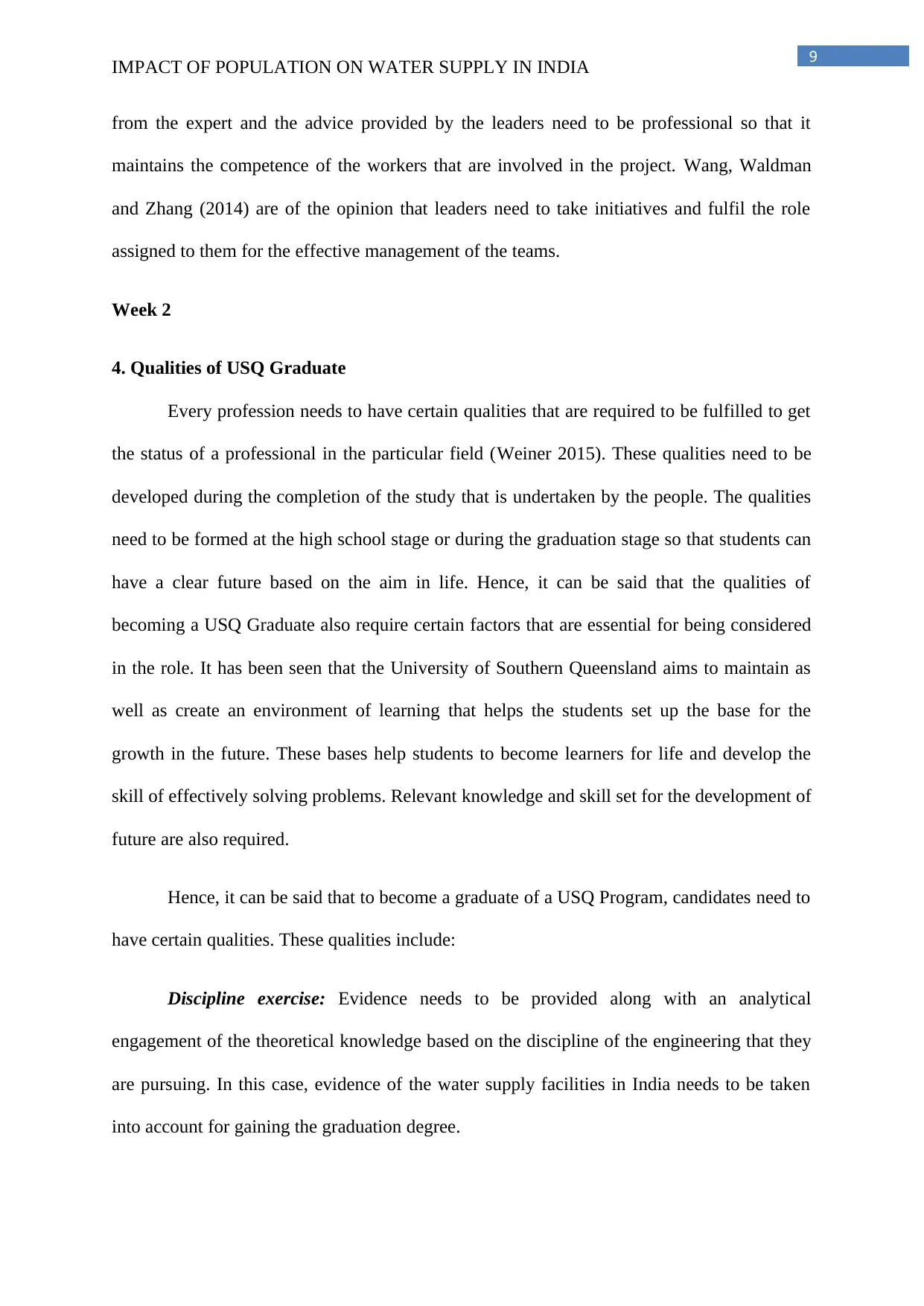
9
IMPACT OF POPULATION ON WATER SUPPLY IN INDIA
from the expert and the advice provided by the leaders need to be professional so that it
maintains the competence of the workers that are involved in the project. Wang, Waldman
and Zhang (2014) are of the opinion that leaders need to take initiatives and fulfil the role
assigned to them for the effective management of the teams.
Week 2
4. Qualities of USQ Graduate
Every profession needs to have certain qualities that are required to be fulfilled to get
the status of a professional in the particular field (Weiner 2015). These qualities need to be
developed during the completion of the study that is undertaken by the people. The qualities
need to be formed at the high school stage or during the graduation stage so that students can
have a clear future based on the aim in life. Hence, it can be said that the qualities of
becoming a USQ Graduate also require certain factors that are essential for being considered
in the role. It has been seen that the University of Southern Queensland aims to maintain as
well as create an environment of learning that helps the students set up the base for the
growth in the future. These bases help students to become learners for life and develop the
skill of effectively solving problems. Relevant knowledge and skill set for the development of
future are also required.
Hence, it can be said that to become a graduate of a USQ Program, candidates need to
have certain qualities. These qualities include:
Discipline exercise: Evidence needs to be provided along with an analytical
engagement of the theoretical knowledge based on the discipline of the engineering that they
are pursuing. In this case, evidence of the water supply facilities in India needs to be taken
into account for gaining the graduation degree.
IMPACT OF POPULATION ON WATER SUPPLY IN INDIA
from the expert and the advice provided by the leaders need to be professional so that it
maintains the competence of the workers that are involved in the project. Wang, Waldman
and Zhang (2014) are of the opinion that leaders need to take initiatives and fulfil the role
assigned to them for the effective management of the teams.
Week 2
4. Qualities of USQ Graduate
Every profession needs to have certain qualities that are required to be fulfilled to get
the status of a professional in the particular field (Weiner 2015). These qualities need to be
developed during the completion of the study that is undertaken by the people. The qualities
need to be formed at the high school stage or during the graduation stage so that students can
have a clear future based on the aim in life. Hence, it can be said that the qualities of
becoming a USQ Graduate also require certain factors that are essential for being considered
in the role. It has been seen that the University of Southern Queensland aims to maintain as
well as create an environment of learning that helps the students set up the base for the
growth in the future. These bases help students to become learners for life and develop the
skill of effectively solving problems. Relevant knowledge and skill set for the development of
future are also required.
Hence, it can be said that to become a graduate of a USQ Program, candidates need to
have certain qualities. These qualities include:
Discipline exercise: Evidence needs to be provided along with an analytical
engagement of the theoretical knowledge based on the discipline of the engineering that they
are pursuing. In this case, evidence of the water supply facilities in India needs to be taken
into account for gaining the graduation degree.
Paraphrase This Document
Need a fresh take? Get an instant paraphrase of this document with our AI Paraphraser
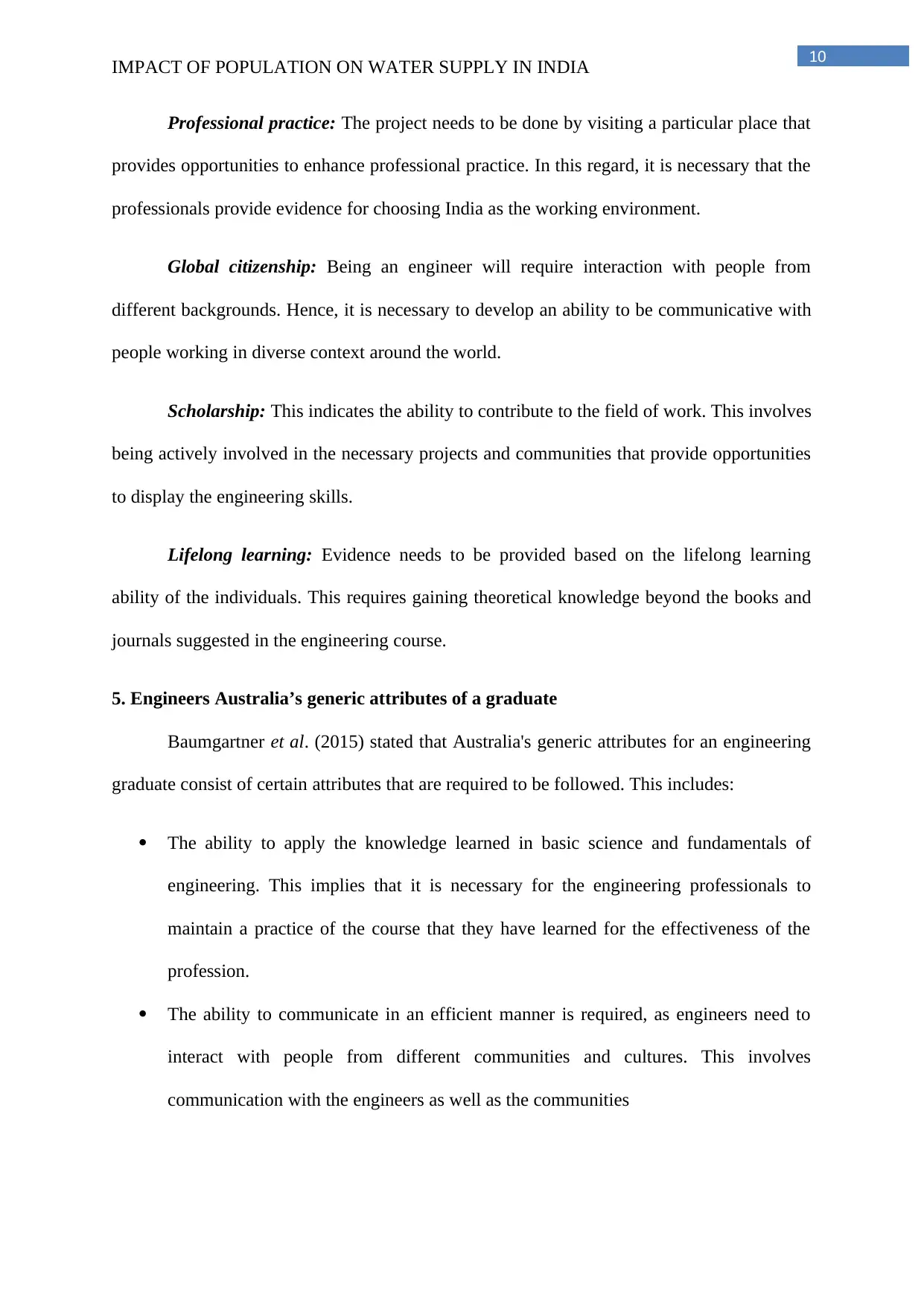
10
IMPACT OF POPULATION ON WATER SUPPLY IN INDIA
Professional practice: The project needs to be done by visiting a particular place that
provides opportunities to enhance professional practice. In this regard, it is necessary that the
professionals provide evidence for choosing India as the working environment.
Global citizenship: Being an engineer will require interaction with people from
different backgrounds. Hence, it is necessary to develop an ability to be communicative with
people working in diverse context around the world.
Scholarship: This indicates the ability to contribute to the field of work. This involves
being actively involved in the necessary projects and communities that provide opportunities
to display the engineering skills.
Lifelong learning: Evidence needs to be provided based on the lifelong learning
ability of the individuals. This requires gaining theoretical knowledge beyond the books and
journals suggested in the engineering course.
5. Engineers Australia’s generic attributes of a graduate
Baumgartner et al. (2015) stated that Australia's generic attributes for an engineering
graduate consist of certain attributes that are required to be followed. This includes:
The ability to apply the knowledge learned in basic science and fundamentals of
engineering. This implies that it is necessary for the engineering professionals to
maintain a practice of the course that they have learned for the effectiveness of the
profession.
The ability to communicate in an efficient manner is required, as engineers need to
interact with people from different communities and cultures. This involves
communication with the engineers as well as the communities
IMPACT OF POPULATION ON WATER SUPPLY IN INDIA
Professional practice: The project needs to be done by visiting a particular place that
provides opportunities to enhance professional practice. In this regard, it is necessary that the
professionals provide evidence for choosing India as the working environment.
Global citizenship: Being an engineer will require interaction with people from
different backgrounds. Hence, it is necessary to develop an ability to be communicative with
people working in diverse context around the world.
Scholarship: This indicates the ability to contribute to the field of work. This involves
being actively involved in the necessary projects and communities that provide opportunities
to display the engineering skills.
Lifelong learning: Evidence needs to be provided based on the lifelong learning
ability of the individuals. This requires gaining theoretical knowledge beyond the books and
journals suggested in the engineering course.
5. Engineers Australia’s generic attributes of a graduate
Baumgartner et al. (2015) stated that Australia's generic attributes for an engineering
graduate consist of certain attributes that are required to be followed. This includes:
The ability to apply the knowledge learned in basic science and fundamentals of
engineering. This implies that it is necessary for the engineering professionals to
maintain a practice of the course that they have learned for the effectiveness of the
profession.
The ability to communicate in an efficient manner is required, as engineers need to
interact with people from different communities and cultures. This involves
communication with the engineers as well as the communities
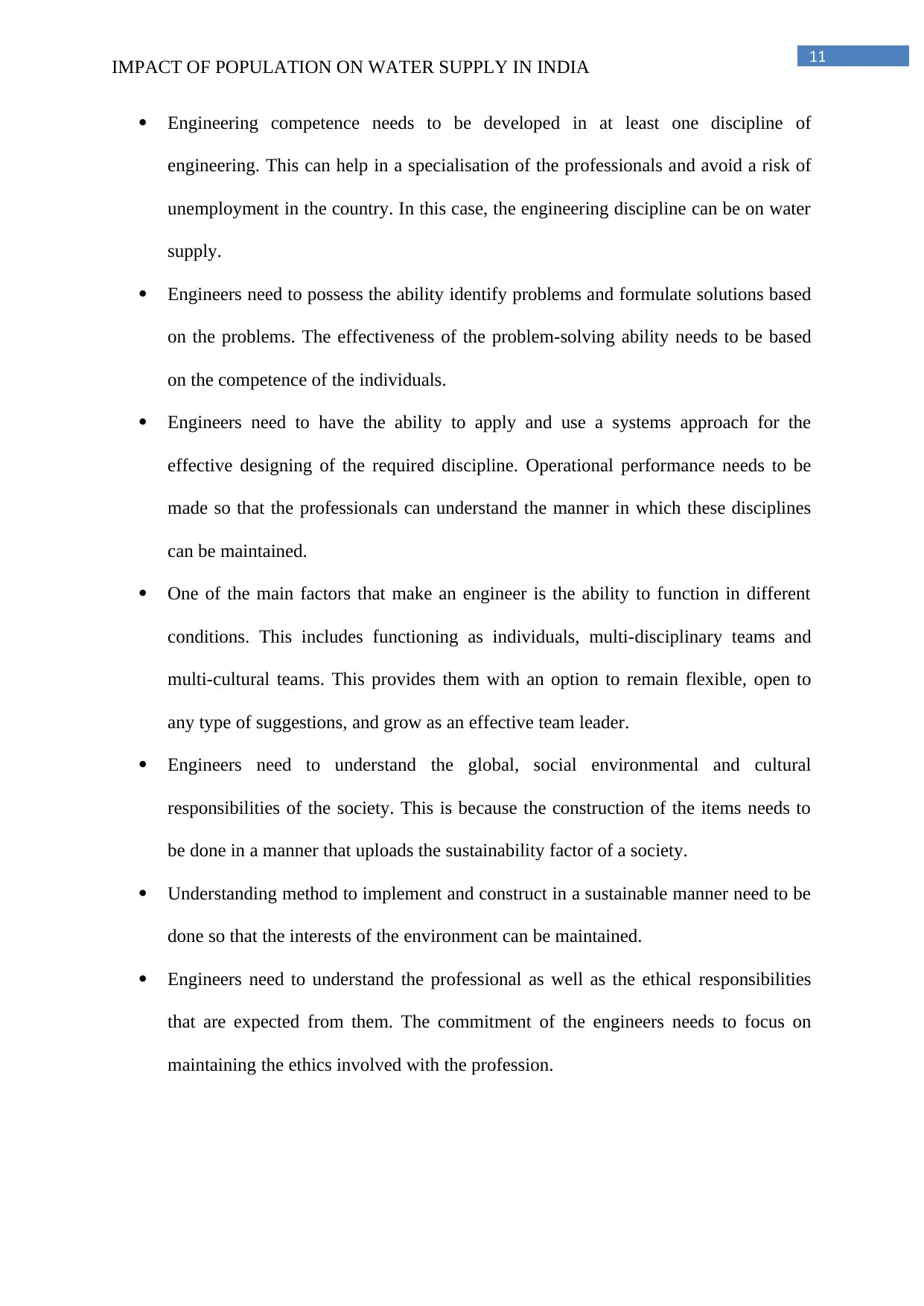
11
IMPACT OF POPULATION ON WATER SUPPLY IN INDIA
Engineering competence needs to be developed in at least one discipline of
engineering. This can help in a specialisation of the professionals and avoid a risk of
unemployment in the country. In this case, the engineering discipline can be on water
supply.
Engineers need to possess the ability identify problems and formulate solutions based
on the problems. The effectiveness of the problem-solving ability needs to be based
on the competence of the individuals.
Engineers need to have the ability to apply and use a systems approach for the
effective designing of the required discipline. Operational performance needs to be
made so that the professionals can understand the manner in which these disciplines
can be maintained.
One of the main factors that make an engineer is the ability to function in different
conditions. This includes functioning as individuals, multi-disciplinary teams and
multi-cultural teams. This provides them with an option to remain flexible, open to
any type of suggestions, and grow as an effective team leader.
Engineers need to understand the global, social environmental and cultural
responsibilities of the society. This is because the construction of the items needs to
be done in a manner that uploads the sustainability factor of a society.
Understanding method to implement and construct in a sustainable manner need to be
done so that the interests of the environment can be maintained.
Engineers need to understand the professional as well as the ethical responsibilities
that are expected from them. The commitment of the engineers needs to focus on
maintaining the ethics involved with the profession.
IMPACT OF POPULATION ON WATER SUPPLY IN INDIA
Engineering competence needs to be developed in at least one discipline of
engineering. This can help in a specialisation of the professionals and avoid a risk of
unemployment in the country. In this case, the engineering discipline can be on water
supply.
Engineers need to possess the ability identify problems and formulate solutions based
on the problems. The effectiveness of the problem-solving ability needs to be based
on the competence of the individuals.
Engineers need to have the ability to apply and use a systems approach for the
effective designing of the required discipline. Operational performance needs to be
made so that the professionals can understand the manner in which these disciplines
can be maintained.
One of the main factors that make an engineer is the ability to function in different
conditions. This includes functioning as individuals, multi-disciplinary teams and
multi-cultural teams. This provides them with an option to remain flexible, open to
any type of suggestions, and grow as an effective team leader.
Engineers need to understand the global, social environmental and cultural
responsibilities of the society. This is because the construction of the items needs to
be done in a manner that uploads the sustainability factor of a society.
Understanding method to implement and construct in a sustainable manner need to be
done so that the interests of the environment can be maintained.
Engineers need to understand the professional as well as the ethical responsibilities
that are expected from them. The commitment of the engineers needs to focus on
maintaining the ethics involved with the profession.
⊘ This is a preview!⊘
Do you want full access?
Subscribe today to unlock all pages.

Trusted by 1+ million students worldwide
1 out of 37
Related Documents
Your All-in-One AI-Powered Toolkit for Academic Success.
+13062052269
info@desklib.com
Available 24*7 on WhatsApp / Email
![[object Object]](/_next/static/media/star-bottom.7253800d.svg)
Unlock your academic potential
Copyright © 2020–2026 A2Z Services. All Rights Reserved. Developed and managed by ZUCOL.




